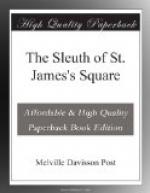“Nevertheless, monsieur” — and his thin yellow lips curled — “for the sake of my depleted revenues I could have wished that the decision of this court had been other than it was.”
“And what did it decide?” asked the American.
“It decided, monsieur,” replied the Count, “that my estates in Salerno must continue to be charged with the gratuity to the indigent relative.
“That is to say, monsieur, it decided, because the great pagan did not wait to die in agony, did not wait for the mortal wounds inflicted by the would-be assassin to kill him, that interesting person — the man in the green hat — was not guilty of murder in the first degree and could not be hanged!”
Note — See State versus Angelina; 80 Southeastern Reporter, 141: “The intervening responsible agent who wrongfully accelerates death is guilty of the murder, and not the one who inflicted the first injury, though in itself mortal.”
VI. The Wrong Sign
It was an ancient diary in a faded leather cover. The writing was fine and delicate, and the ink yellow with age. Sir Henry Marquis turned the pages slowly and with care for the paper was fragile.
We had dined early at the Ritz and come in later to his great home in St. James’s Square.
He wished to show me this old diary that had come to him from a branch of his mother’s family in Virginia — a branch that had gone out with a King’s grant when Virginia was a crown colony. The collateral ancestor, Pendleton, had been a justice of the peace in Virginia, and a spinster daughter had written down some of the strange cases with which her father had been concerned.
Sir Henry Marquis believed that these cases in their tragic details, and their inspirational, deductive handling, equaled any of our modern time. The great library overlooking St. James’s Square, was curtained off from London. Sir Henry read by the fire; and I listened, returned, as by some recession of time to the Virginia of a vanished decade. The narrative of the diary follows:
My father used to say that the Justice of God was sometimes swift and terrible. He said we thought of it usually as remote and deliberate, a sort of calm adjustment in some supernatural Court of Equity. But this idea was far from the truth. He had seen the justice of God move on the heels of a man with appalling swiftness; with a crushing force and directness that simply staggered the human mind. I know the case he thought about.
Two men sat over a table when my father entered. One of them got up. He was a strange human creature, when you stood and looked calmly at him. You thought the Artificer had designed him for a priest of the church. He had the massive features and the fringe of hair around his bald head like a tonsure. At first, to your eye, it was the vestments of the church, he lacked; then you saw that the lack was something fundamental; something organic in the nature of the man. And as he held and stimulated your attention you got a fearful idea, that the purpose for which this human creature was shaped had been somehow artfully reversed!




